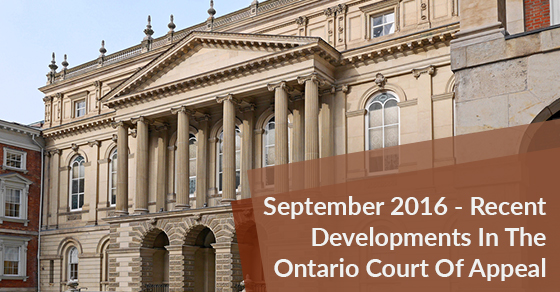September 2016 – Recent Developments In The Ontario Court Of Appeal

R v Dickson 2016 ONCA 665 – Requesting the Appointment of Counsel
When an individual wants to appeal a decision by the Court, he is allowed to request a judge to assign counsel to represent them on the matter. Two criteria must be met, namely 1) it is in the interests of justice, and 2) the accused does not have the means to obtain counsel on their own. In this case, Mr. Dickinson first sought the help of Legal Aid to represent him on an appeal of his conviction for first-degree murder. The Crown’s theory of the case was that Mr. Dickinson came into the deceased’s room to sexual assault her, and while committing the sexual assault, choked the deceased, which caused her death. This theory is supported by strong forensic evidence such as the presence of Mr. Dickinson’s semen on the deceased’s abdomen and thigh, as well as his DNA under the deceased’s fingernails. Both Legal Aid and the Ontario Court of Appeal denied Mr. Dickinson’s request because of the strength of the Crown’s case, and the fact that Mr. Dickinson was an intelligent man who had access to both duty counsel and an experienced appellate lawyer.
R v Chhina 2016 ONCA 663 – The Issue of Credibility in Drug Cases
The accused was convicted of importing and possession for the purpose of trafficking cocaine along with another individual. The cocaine was discovered while the two accused were in secondary inspection at the Canada-US border. It was inside a fuse-box wrapped in the appellant’s t-shirt. The central issue at trial was credibility, as both men denied putting the cocaine inside the fuse box. The appellant argued that the co-accused hid the cocaine while proceeding from the vehicle to secondary inspection. Since this theory could not be supported by any of evidence, the appeal was dismissed and the conviction was upheld.
R v Merelles 2016 ONCA 647 – The Validity of Search Warrants based on the Information of Informants
The accused was convicted of possession of heroin and cocaine for the purpose of trafficking, as well as possession of the proceeds of crime. Mr. Merelles appealed his conviction on the basis that the search warrant executed by the police on three different properties was invalid. The trial judge held that Mr. Merelles could not challenge the validity of the search because he did not have a reasonable expectation of privacy over the premises. A confidential informant provided information about Mr. Merelles to the police. The informant’s information was detailed, first-hand, and he had proven to be reliable in the past, and the Court held that the requirements for the issuance of a search warrant were met.
R v Hope, 2016 ONCA 648 – The Application of Gladue Principles to Bail Hearings
In the past, considerations of the unique background factors that may lead an aboriginal person to commit a crime (known as the Gladue principles) were only applied during the sentencing of these individuals. However, Ontario courts have established that Gladue principles also apply to bail hearings. In this case, the accused was convicted for second-degree murder. However, after serving 7 years in jail, this decision was successfully appealed, resulting in the conviction being set aside and a new trial ordered. Consequently, Mr. Hope applied for bail. The Court of Appeal held that even though Mr. Hope is still awaiting trial for a serious offence, application of the Gladue principles, in conjunction with the fact that he has already served 7 years in prison without any issues, warranted that he be released on bail.
R v John 2016 ONCA 615 – The Proper Conduct of Crown Counsel
Crown counsel has a duty to act in a fair and impartial manner throughout the criminal process. In this case, Crown counsel significantly strayed away from what is considered reasonable conduct several times. For example, during her cross-examination, the Crown attacked the credibility of the accused because he exercised his constitutional right to remain silent. Similarly, the Crown also made various submissions that were unsupported by the evidence. As a result, the trial judge found it necessary to provide instructions to the jury to correct the numerous mistakes the Crown had made. The accused appealed his conviction of second-degree murder on the basis that the Crown’s transgressions negatively impacted the jury. However, the Court of Appeal held that the corrective instructions given by the trial judge sufficiently addressed the problems created by the Crown and hence a new trial was not justified.

